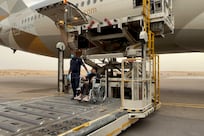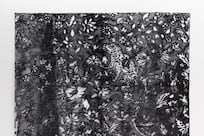MOSCOW // Last November, with Russian parliamentary elections just weeks away, Vladimir Putin, then president of Russia, took the stage at a pro-Kremlin rally and launched into a visceral, vitriolic attack on western-leaning, liberal parties competing on the ballot with his United Russia party. "They want to come back, to return to power, to spheres of influence, and gradually restore oligarchic rule based on corruption and lies," Mr Putin, now Russia's powerful prime minister, told the crowd. The speech came as part of a co-ordinated smear campaign against liberal Russian parties, the brunt of which was borne by the Union of Right Forces, or SPS, which held senior posts in the 1990s under Boris Yeltsin and is indelibly linked in the minds of millions of Russians with the shady privatisations and widespread poverty of that decade. United Russia went on to win a constitutional majority in the Russian parliament with more than 60 per cent of the vote. SPS garnered less than one per cent, failing to win a single seat and cementing its political marginalisation. In Russia's tightly managed political landscape, the Kremlin dictates the rules of the game - and who is allowed to play. Now almost a year after Mr Putin's speech, SPS is locked in a bitter dispute whether to accept the Kremlin's rules or risk extinction by trying to fight the merciless political machine he created. For several months now, SPS officials have been in negotiations with the Kremlin about creating a new pro-business, liberal party that will operate on the Kremlin's terms, said the acting head of the party, Leonid Gozman. "Without permission from the Kremlin, it's impossible to create a party," Mr Gozman said. The decision to consider co-operating with the Kremlin prompted the SPS head, Nikita Belykh, a fierce Kremlin critic, to tender his resignation last week. Senior SPS officials are to convene today to determine the fate of the party. Should the party's political council opt to work with the Kremlin, SPS would likely adopt a new name, marking the end of one of Russia's oldest political parties, Mr Gozman said. The existential crisis faced by SPS is one shared by an array of Russian political parties and movements espousing the merits of democracy, a concept that spawned the Russian pejorative "shitocracy" because of Russians' widespread dissatisfaction with the often corrupt free-market reforms of the 1990s. Liberal parties have also been racked by infighting and an inability to effectively consolidate their supporters as Mr Putin consolidated his power during his eight years in office before handing the reigns to his hand-picked successor, Dmitry Medvedev, in March. The fact that Mr Putin also oversaw an unprecedented economic boom that made consumerism, rather than politics, a national obsession did not help the liberal camp either. Russian liberals, however, also face an increasing number of technical obstacles to their survival under Mr Putin, including inflated membership numbers required for registration. On Monday, one former prime minister, Mikhail Kasyanov, who became a Kremlin critic and opposition politician after Mr Putin fired him in 2004, filed a complaint with the European Court of Human Rights in Strasbourg, France, accusing the Russian government of unfairly denying his political party registration for purportedly failing to prove a membership of at least 50,000. Yabloko, a liberal social-democratic party, has discussed collaboration with Mr Kasyanov, but there "is no talk of a merger", said Yabloko's leader, Sergei Mitrokhin. "Anybody who wants to is free to join us," said Mr Mitrokhin, whose party also held government posts in the 1990s but which now has but a few seats in regional legislatures, including Moscow's. There has long been talk in Russia of a merger between Yabloko and SPS, but the departure of Mr Belykh and the prospect of SPS's possible co-operation with the Kremlin has all but scuttled any such possibility, Mr Mitrokhin said. One political analyst, Dmitry Oreshkin, said there is an electorate - around 20 million or so in Russia - attracted to the European values professed by the liberal camp, but that a majority of them have written off politics and "prefer to busy themselves with their personal affairs". There are currently only four parties represented in the Russian parliament: overtly pro-Kremlin parties United Russia and A Just Russia; the Communists and the Liberal Democrats, who position themselves as opposition parties but rarely criticise the Kremlin directly. But a new player appeared on the scene of Russian liberal politics this week - along with a very old player. Alexander Lebedev, a billionaire banker and former Russian parliamentarian who describes himself as a "capitalist-idealist", announced this week that he planned to create a new democratic party together with Mikhail Gorbachev, the last Soviet leader. Mr Lebedev, a former Soviet foreign intelligence officer and erstwhile Moscow mayoral candidate, said on his blog that the working name is the Independent Democratic Party. Mr Lebedev and Mr Gorbachev are co-owners of the newspaper Novaya Gazeta, where Anna Politkovskaya worked as an investigative journalist before she was killed. Politkovskaya was one of the harshest critics of the Kremlin in the Russian media. "He gave our people freedom, but we just can't learn how to use it," Mr Lebedev wrote of Mr Gorbachev. Goals of the party include "less state capitalism", a return of gubernatorial elections scrapped by Mr Putin, development of independent media, securing an independent parliament and judiciary system and reforming Russia's law enforcement agencies, Mr Lebedev wrote. Mr Oreskhin, the political analyst, said there is a chance for such a party to be registered, because it would be "improper" to reject Mr Gorbachev. "Although, the current ruling class's understanding of 'propriety' is quite slippery," Mr Oreshkin said. cschreck@thenational.ae
Pressure by Kremlin fractures old party
Last November Vladimir Putin launched into a vitriolic attack on liberal parties competing on the ballot with his party.
Editor's picks
More from the national





